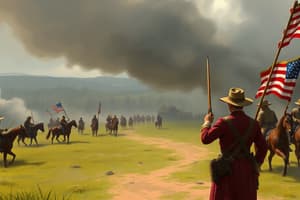Podcast
Questions and Answers
What was Reconstruction?
What was Reconstruction?
- The period after the Civil War (correct)
- A time during the Civil War
- A government strategy to expand the Union
- A plan to establish equal rights in the South
What did the Thirteenth Amendment achieve?
What did the Thirteenth Amendment achieve?
It abolished slavery.
What was the purpose of the Freedmen's Bureau?
What was the purpose of the Freedmen's Bureau?
To help protect newly freed African Americans.
What were Black Codes?
What were Black Codes?
What rights are guaranteed by Civil Rights?
What rights are guaranteed by Civil Rights?
What did the Fourteenth Amendment ensure?
What did the Fourteenth Amendment ensure?
What was established by the Fifteenth Amendment?
What was established by the Fifteenth Amendment?
What were Jim Crow Laws?
What were Jim Crow Laws?
What is segregation?
What is segregation?
What was the ruling in Plessy v. Ferguson?
What was the ruling in Plessy v. Ferguson?
Flashcards are hidden until you start studying
Study Notes
Reconstruction
- Period following the Civil War aimed at rebuilding southern states and reintegrating them into the Union.
- Division between President Johnson's lenient reconciliation approach and Congressional Republicans' push for equal rights and free labor.
Thirteenth Amendment
- Ratified in 1865, this amendment abolished slavery in the United States, marking a significant legal change in civil rights.
Freedmen's Bureau
- Established at the end of the Civil War to assist newly freed African Americans.
- Provided essential services such as food, medical care, education, and occasionally land.
- Advocated for fair wages and improved working conditions for former slaves.
Black Codes
- Laws enacted in 1855-1856 in former Confederate states to restrict the rights of African Americans.
- Aimed to limit voting rights, secure labor for planters, and maintain a social hierarchy where freedmen remained disadvantaged.
Civil Rights
- Refers to the rights guaranteed by the Constitution, ensuring equal treatment under the law for all citizens.
Fourteenth Amendment
- Ratified in 1868, this amendment granted citizenship to anyone born in the U.S. and guaranteed equal protection under the law.
- Affirmed that African Americans hold citizenship rights and cannot be treated unequally.
Fifteenth Amendment
- Ratified in 1870, it prohibited states from denying the right to vote based on race, color, or previous status as a slave.
Jim Crow Laws
- Enacted in the southern United States after the Civil War, these laws enforced racial segregation.
- Created separate facilities for black and white individuals in public spaces, including rail cars, schools, and restaurants.
Segregation
- Defined as the separation of individuals based on racial, ethnic, or other differences, leading to widespread discrimination.
Plessy v. Ferguson
- Landmark 1896 Supreme Court case ruling that upheld segregation laws, stating they did not violate the 14th Amendment if facilities were "roughly equal."
- Established the "separate but equal" doctrine, legitimizing racial segregation for decades.
Studying That Suits You
Use AI to generate personalized quizzes and flashcards to suit your learning preferences.



